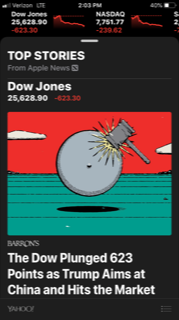
When you pull up the stock app on your iPhone, the first thing that greets you is a quote from the Dow Jones Industrial Average (DJIA) along with an eye-popping headline.
Dow plummets 600 points [followed by whatever Trump tweeted recently].
Solid click-bait stuff right there.
While our economic outlook may be a cause for concern (we’ll get to that later), the Dow is the last place we should be looking to make that determination.
Here are several reasons why you should stop paying attention to these headlines and ignore the Dow for good – followed by what you should pay attention to instead.
1. The Dow is old. Like, really old.
The Dow Jones Industrial Average is a stock market index that was created in, wait for it, 1896.
How many things that were created 123 years ago are we still using today in it’s original form?
Not many…
2. The Dow only consists of 30 stocks.
There are roughly 4,000 publicly traded companies in the U.S. and the Dow tracks less than 1% of them, so it’s far from being a comprehensive representation of how things are going.
Here are the companies that make up the Dow:
| 3M | American Express | Apple |
| Boeing | Caterpillar | Chevron |
| Cisco | Coca-Cola | Dow |
| Exxon | Goldman Sachs | The Home Depot |
| IBM | Intel | Johnson & Johnson |
| JPMorgan Chase | McDonald’s | Merck |
| Microsoft | Nike | Pfizer |
| Procter & Gamble | Travelers | UnitedHealth |
| United Technologies | Verizon | Visa |
| Walmart | Walgreens | Walt Disney |
A decent cross-section of businesses for sure, but there are some notable companies missing, like Google (Alphabet) and Amazon to name a few.
3. The Dow is Price-Weighted
Anyone who’s anyone knows that share prices alone are largely irrelevant – it’s all about market cap:
# of shares x price = total value of a company (aka Market Capitalization)
Most indices, like the S&P 500, are weighted by market cap; so, bigger businesses have a bigger impact on the movement of the overall index.
The Dow, however, is weighted by price. So, Boeing, with the most expensive share price, has the greatest influence over the index while Apple, who is valued at 4x more than Boeing, is not as significant.
| Company | Share Price | Market Cap |
| Boeing | $356 | $200B |
| Apple | $202 | $915B |
4. The Dow is Often Quoted in Points
This is not as much a knock on the index itself, but more-so a jab at those that talk about the index.
I can’t tell you how many times I’ve heard a co-worker say something like, “Dude, the Dow is down like 300 points,” clearly regurgitating the headline they just read.
But, what does that even mean? What is 300 points? Is that a lot?
With the index hovering around 25,600 points today, a 300 point drop is just over 1%.
Do you think that citing a 1% drop would instill any fear and get people to click?
Probably not…
So, what should you, a savvy investor, pay attention to instead?
I would first tell you to focus on things you can control, like your income, spending, savings rate, your asset allocation and the system you have in place to automatically invest every month.
Closely monitoring things you can’t control (like the performance of stocks) isn’t exactly a recipe for success. In fact, it’s just the opposite. Fidelity did a study and found that the accounts that had the best performance was from (1) people who forgot they had an account and (2) dead people.
But, if you want to closely monitor stocks, the S&P 500 and Wilshire 5000 are much better indices to follow. The S&P 500 tracks the 500 largest companies in the US while the Wilshire 5000 index tracks every publicly traded US company (around ~3500 today).